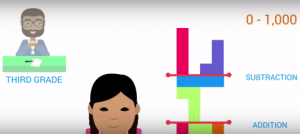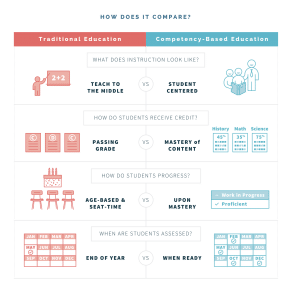What Is Competency Education?
CompetencyWorks Blog

There are lots of ways that the intermediary organizations working on competency education have been catalytic in supporting districts and schools. Communication has not been one of our strengths. Education leaders have been engaging their communities around the country on the need for a new way of organizing schools. And they’ve been doing it without adequate tools.
Part of the reason we don’t have effective tools is that many organizations try to simplify competency education into flexible pacing. They use phrases such as “students advance based on mastery of a given content, rather than based on credits or seat time.” This emphasis on pace misses the point entirely – competency education is a structure designed to ensure that students are learning and making progress. Accountability is embedded within the system through transparent, calibrated ways to determine proficiency and ensure that students are building and able to apply a wide range of skills (competency, not just standards). This emphasis on pace has created a new problem for us — people who are concerned about ineffective use of online learning have now targeted competency education as well.
Well, thanks to KnowledgeWorks, we’ve had a major breakthrough. They’ve created a video that describes a competency-based school with personalized support. They’ve done it with warmth, light-heartedness, attention to challenging racial stereotypes, and the inclusion of real teachers and real students. It’s the best I’ve seen and I think will be helpful to education leaders.
https://www.youtube.com/watch?v=IGLJWAQn1CU
We at CompetencyWorks also tried to fill the gap of a lack of a primer on competency education. In the most recent paper Reaching the Tipping Point: Insights on Advancing Competency Education in New England, we included a more extensive introduction to competency education with a section on why the traditional system is a barrier to greater equity and higher achievement. We produced the excerpt What Is Competency Education? separately for educators to use in discussions.
It’s possible that the video and the excerpt might be used to start up conversations with teachers, parents, community leaders, and even students. However, neither of these tools answers that next set of questions that are generated, such as:
- How can a teacher meet all the needs of students in their classroom, especially if there are wide ranges of skill levels?
- If you meet students at their performance levels, what prevents us from returning to the days of tracking?
- What happens if a student doesn’t master the skill level within the semester or year? Are we going to retain all these students?
It’s obvious we need a secondary set of tools to answer these questions in a way that helps people better understand the new paradigm of competency education.
Readers, you could make a huge contribution by watching the video and reading What Is Competency Education? and listing all the questions you have in the comments section below (or send them to me). That will help anyone working on tools make sure they are addressing the right set of questions.
Other Resources
For those of you trying to organize your talking points and elevator speeches on competency education, there are other resources available that you might find helpful.
- Achieve has created a communications toolkit including an infographic.
- Foundation for Excellence in Education has created a communications toolkit aimed at state policymakers. You might also find their description of fundamental principles and their infographic of how traditional and competency education helpful.

- Great Schools Partnership generously shares their materials and powerpoints. Start with Proficiency Made Simple.
- CompetencyWorks created introductory materials a few years back. Please feel free to use these resources under the names of your organization. Choose from general, state policymakers, and federal policymakers.
- Maine Center for Best Practices has a number of videos of teachers and students talking that can be useful to start of conversations.
It is also helpful to see how other districts and schools are describing competency education and responding to questions.
- Westminster Public Schools (Adams 50)
- Pittsfield School District
- Rochester School District
- Sanborn High School – a blog by principal Brian Stack on FAQs
Dear readers – if you’ve developed or used other resources, we’d love to add them to our growing list of resources.